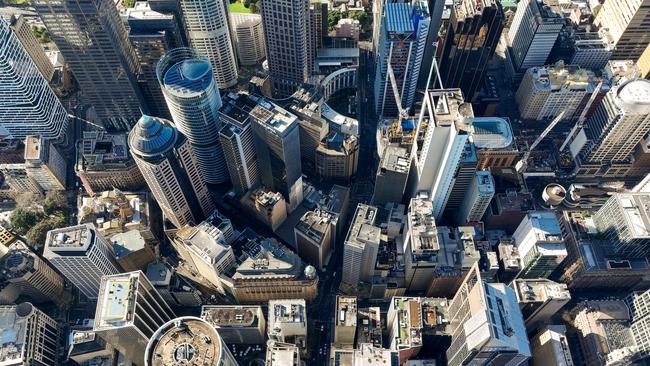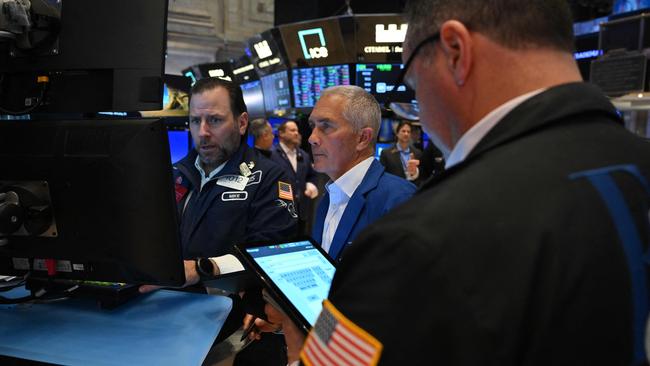Above all costs: big business battling their own ‘mortgage cliff’
Big business is right in the middle of an almighty financing storm, with borrowing costs now the new inflation front.

Business
Don't miss out on the headlines from Business. Followed categories will be added to My News.
Big business is right in the middle of an almighty financing storm, and bosses being buffeted are already feeling the pinch from surging lending costs.
In many ways, it is corporate Australia’s version of the “mortgage cliff”. They face a big shock as they start to refinance billions of dollars of cheap debt at much higher interest rates.
While households have been able to navigate their way through the mortgage cliff, it has undoubtably come with pain, including cutting back in many areas.
Businesses are going through this too. Some have experienced a jump of as much as a 60 per cent in interest repayments in the past year after going out to global money markets or bank syndicates to refinance their long-term debt.
And with central banks around the world still reluctant to start cutting rates, this has kept financing costs higher for longer.

The big danger, though, for some companies is that cooling inflation is making it harder to pass on their higher interest rate bills to customers.
This means cost savings will need to be found elsewhere, often in investment and sometimes in job cuts, just to keep the cash flowing.
In recent days, property developer Mirvac revealed it had a 60 per cent run-up in its own financing costs in the December half. Smaller rival Charter Hall Long Wale REIT saw a 33 per cent jump in financing costs. Others like AGL experienced a 27 per cent jump.
It should be remembered, debt is not a dirty word for business. It is often more efficient for businesses to carry debt from one year to the next to diversify funding and manage swings in cash flows. Indeed, debt is nearly always a cheaper form of funding than equity, particularly when used for expansion. However, economies move in cycles, so debt needs to be handled with care.
Like households, too much borrowing threatens to choke off vital cash flow and can severely limit options in times of stress or a downturn. Companies, too, can be caught short if funding markets freeze, such as the temporary slowdown during last year’s US banking crisis. Coming days will see a fuller picture of the extent of the debt spike on the ASX 200, with dozens of big corporates scheduled to deliver results.
Transport operation Aurizon has seen a jump in debt levels following the buyout of rail operator One Rail, and is worth watching, with its debt to net tangible assets (gearing) ratio running in excess of 50 per cent. Generally, most businesses like to see this ratio between 25 and 35 per cent. Some companies riding a commodity boom, including Rio Tinto, have hardly any debt, while coal player Whitehaven has moved from a net debt to a net cash position in the past year. BHP had a jump in debt, which was used to partially fund its $9.6bn buyout of OZ Minerals.
Sustained costs
Like wages, rising debt payments across some corporates will represent a sustained cost in coming years, even as inflation starts to cool. Debt repayments flew under the radar for years but are now being eyed as a potential weak spot among investors. A look at accounts released in recent days shows just how quickly the debt cliff has arrived.
Residential developer and office tower owner Mirvac is now paying just over $18m in interest every month on more than $4.6bn of debt. Interest repayments are now one of Mirvac’s largest non-construction costs. Two years ago, when interest rates were still at rock bottom, the developer was running a monthly interest bill of a little over $10m on a bigger debt pile. There is more interest rate pressure to come for Mirvac, which has nearly $900m of debt to be refinanced within 12 months, much of it at higher rates.

Despite the jump, Mirvac remains modestly leveraged for a real estate trust, with net debt representing 27 per cent of its net assets. Many real estate investment trusts run a ratio above 30 per cent. Charter Hall LWR’s gearing is 34.5 per cent. Industrial property developer Goodman Group is notorious for keeping debt low; its gearing ratio is currently running at around 8 per cent.
Elsewhere, AGL saw a surge in interest costs despite efforts to pay down debt in recent months. The energy major’s financing costs jumped nearly 27 per cent and are now running at more than $25m a month, according to numbers released in recent days. Coming out of the Covid-19 pandemic, AGL’s repayments were a little over $15m a month, even when it was carrying a bigger debt load. On Wednesday, AGL’s chief financial officer Graham Brown told analysts rising interest rates were behind the higher costs on its $2.5bn borrowing program. Adding to the costs were moves to extend the “tenor” or repayment date on a large slice of AGL’s debt beyond the end of this decade. While that reduces refinancing risk, particularly as AGL faces the closure of its ageing coal-fired generators, it also comes at a higher cost. Even so, AGL now has no major refinancing due until financial 2026.
Crunch year
NBN Co might have the backing of Canberra, but the broadband operator still needs to go prove it can stand on its own feet financially. It is sitting on $20bn of borrowings that were used to pay for the costly rollout of the high speed internet across the country.
NBN’s financing costs hit $917m in the December half, or a whopping $152m a month.
NBN is constantly out in the market refinancing its debt, but that means as debt has been renewed interest charges have jumped 39 per cent.
This year represents another crunch year, with $5bn of cheap loans issued by Canberra a number of years ago to be repaid by the end of June. NBN Co will have to go out to global money markets to refinance the funds. NBN’s high borrowings and heavy operational losses – including a $1bn bottom line loss in the December half – remain a major hurdle to its privatisation – and lower broadband costs.

One debt-heavy player, however, had a surprise drop in interest charges: Transurban, which has $18.5bn borrowings. Interest charges of $360m for the December half were down more than 8 per cent from this time last year. At the current rate, Transurban is paying $55m a month in interest charges. The bulk of Transurban’s tolling contracts are directly linked to moves in inflation, and this allows it to simply pass the jump in funding costs to drivers.
Transurban boss Michelle Jablko was the former toll road operator’s chief financial officer, so she is across the detail of Transurban’s debt demands. Debt management and financing is the real engine behind Transurban’s toll road business.
Its next major refinancing hurdle comes in the 2025 financial year, when $900m needs to be repaid. Then it has $2bn a year later, but interest rates are expected to be much lower by then. “We’ve had really strong appetite from the market … we’re a consistent, steady story with the debt market. They know us and the appetite has been strong,” Jablko says.
Other companies like Boral are using their cash to offset high interest bills. It has more than $888m sitting in the bank, and this is easing repayments on $973m of debt. Boral’s interest bill is a little over $1.6m a month, down from $3.3m this time a year ago. That puts the building materials player in a stronger position over rivals
For business, the cliff has arrived: now it's a matter of staying on the right side of it.
johnstone@theaustralian.com.au
More Coverage
Originally published as Above all costs: big business battling their own ‘mortgage cliff’





